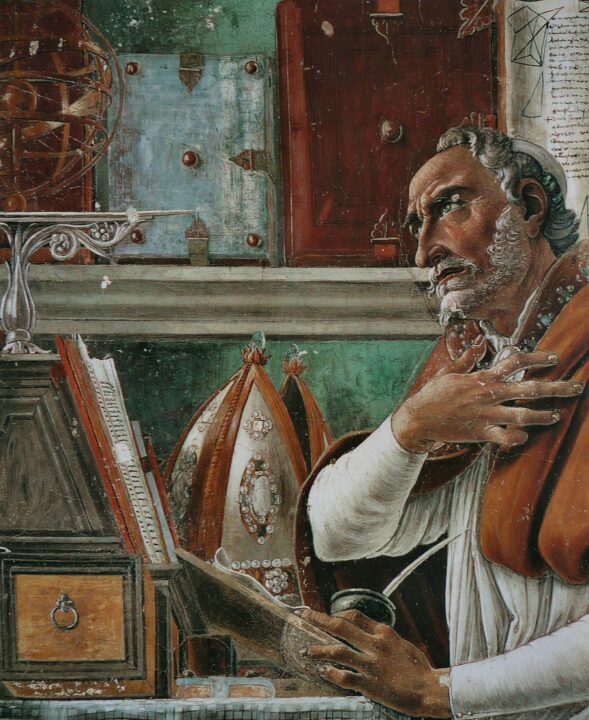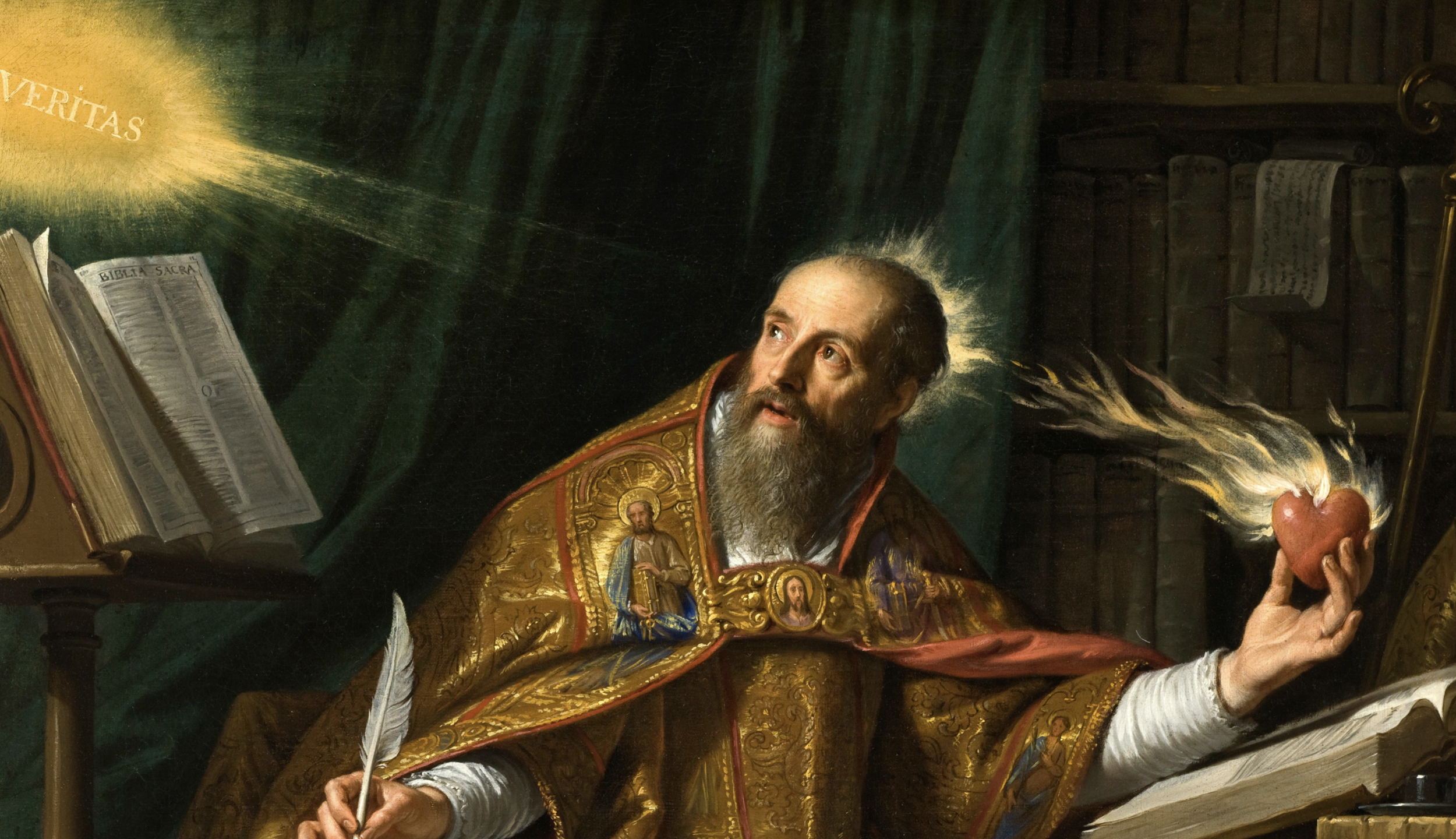Have you ever run into an old friend, one you haven’t seen for years, and the person looks fantastic? You think to yourself, “I didn’t really remember how beautiful she is!” Or maybe you hear a song from decades ago, turn the volume way up, and are transported.
Well, I just had a similar experience rereading the Confessions of St. Augustine. I can see why, at the end of his life, the mathematician, scientist, and philosopher Blaise Pascal gave away his entire library of books, keeping only two: the Bible and Augustine’s Confessions. I was blown away by the beauty, the profundity, the honesty, and the humanity of Augustine’s autobiographical memoir. Augustine’s story focuses on what matters most in life: ambition, passion, family, grief, love, wisdom, death and desire. If you only read one book this year, may I recommend Augustine’s Confessions?

I had forgotten how much conflict raged in Augustine’s life; conflict between Augustine and his mother Monica; conflict between his mother and his cheating, violent father Patricius; conflict among various groups to whom Augustine gave greater or lesser allegiance, such as the Manichaeans, the skeptics, the Platonists, and the Christians.
Most of all, there raged conflict within Augustine himself. His mind was divided, confused, and contorted about matters philosophical and theological. His heart was even more disoriented, perplexed, and bewildered about how to live and how to love. His heart was restless, and in this, he was not alone. Bruce Springsteen was right, “Everybody’s got a hungry heart.”
A bright spot in this dark outer and inner turmoil were his friendships. He paints a vivid picture of one of the great goods in human life: friends.
We had conversation, we shared jokes, make obliging exchanges of favor, read beguiling books together, were silly together and serious together, were at odd from time to time but without resentment, as a person might be at odds with himself—we actually spiced up a plethora of shared opinions with just a sprinkling of differences.
—IV.13
Augustine writes so beautifully of the friendships that he enjoyed, and his great love for his friends, especially a dear friend of his who died. It was by means of friends that Augustine’s life began to turn around. His friends, in an extended sense of the term, included Cicero who stoked a love of wisdom and bishop St. Ambrose who deepened his love of divine wisdom. Ambrose taught him to read the Scriptures intelligently, not as a fundamentalist would.
And yet every human friendship is limited. Friends move away, friends drift apart emotionally, and friends die. But is there any other kind of friendship? Aristotle thought that friendship with God was impossible, the vast distance between them was just too great. But Augustine knew that Jesus said to his disciples the night before he died, “No one has greater love than this, to lay down one’s life for one’s friends. You are my friends” (John 15:13-14).
If only we surrender to God, stop resisting the Divine Love, we can have our greatest good.
Does friendship with God require a long preparation? Augustine says, “If I want to, I can become a friend of God: this very second” (VIII.15). If only we surrender to God, stop resisting the Divine Love, we can have our greatest good. This Greatest Good does not destroy but only enhances the goods of this life. Augustine came to realize that even the good things in human life are marred by treating them as the best things in existence. To worship any created good is to spoil it.
But for a long time, Augustine found this surrender to God’s love very difficult indeed, “I didn’t love you, and I cheated on you like a true slut, and as I cheated there rang around me the words ‘excellent, excellent!’ A ‘loving’ attachment to this world is cheating on you” (I.21). To be attached to the world is to cling to what can be taken away, to seek lasting and perfect satisfaction in what simply cannot give lasting and perfect satisfaction. In his Confessions, Augustine learns from experience that making any created good an idol to replace God leads to disappointment. “My sin was that I sought not in God himself, but in things he had created—in myself and the rest of his creation—delights, heights, and perceptions of what was true and right, and in this way I collapsed into sufferings, embarrassments, and erring ways” (I.31). Augustine recounts fathering a child out of wedlock, abandoning the mother of his son Adeodatus, cheating on his fiancée, stealing pears when he didn’t even want them just for the thrill of stealing, lying to his mother Monica and leaving her heartbroken, having sex in a church, and making his career into an idol. At some level, he knew that what he did was wrong. This lack of personal integrity meant that, whatever he did, part of Augustine was always unsatisfied. The best in Augustine was set against the rest of Augustine.
Indeed, for years, the rhetorician from Hippo suffered from a hidden disease, “Mine was a form of sin harder to heal in that I didn’t consider myself to be the sinner; and it was a damnable wickedness that I preferred for you, the all-powerful God, to be defeated within me, for my own destruction, than for me to be defeated by you for my salvation.” (V.18). But an unknown disease is still a disease, indeed it is made harder to cure precisely because it is unrecognized.
Yet the Divine Physician gives Augustine the bitter medicine he needs to gain health, salus, salvation.
You [God] were always there, savaging me in your pity, scattering the most acrid upsets on everything illicit that I enjoyed, and you did this to make me look for enjoyment without any upset and be unable to find it in anything but you, Master, in anything but you, who fashion pain as a lesson and lambaste us to heal us and kill us so that we don’t die away from you.
—II.4
Sometimes, only by experiencing the failure of lesser goods to deliver on the promise of lasting happiness, can we realize what we really need. But this realization is itself a gift of God, a gift for which Augustine prays, “Come, Master, and act, rouse us and call us back, set us alight and ravish us; blaze for us, grow sweet to us. Let us love you passionately, let us run to you” (VIII.9). Yes, and a reading of the Confessions might be just what we need to spark a blazing fire of love in us.
